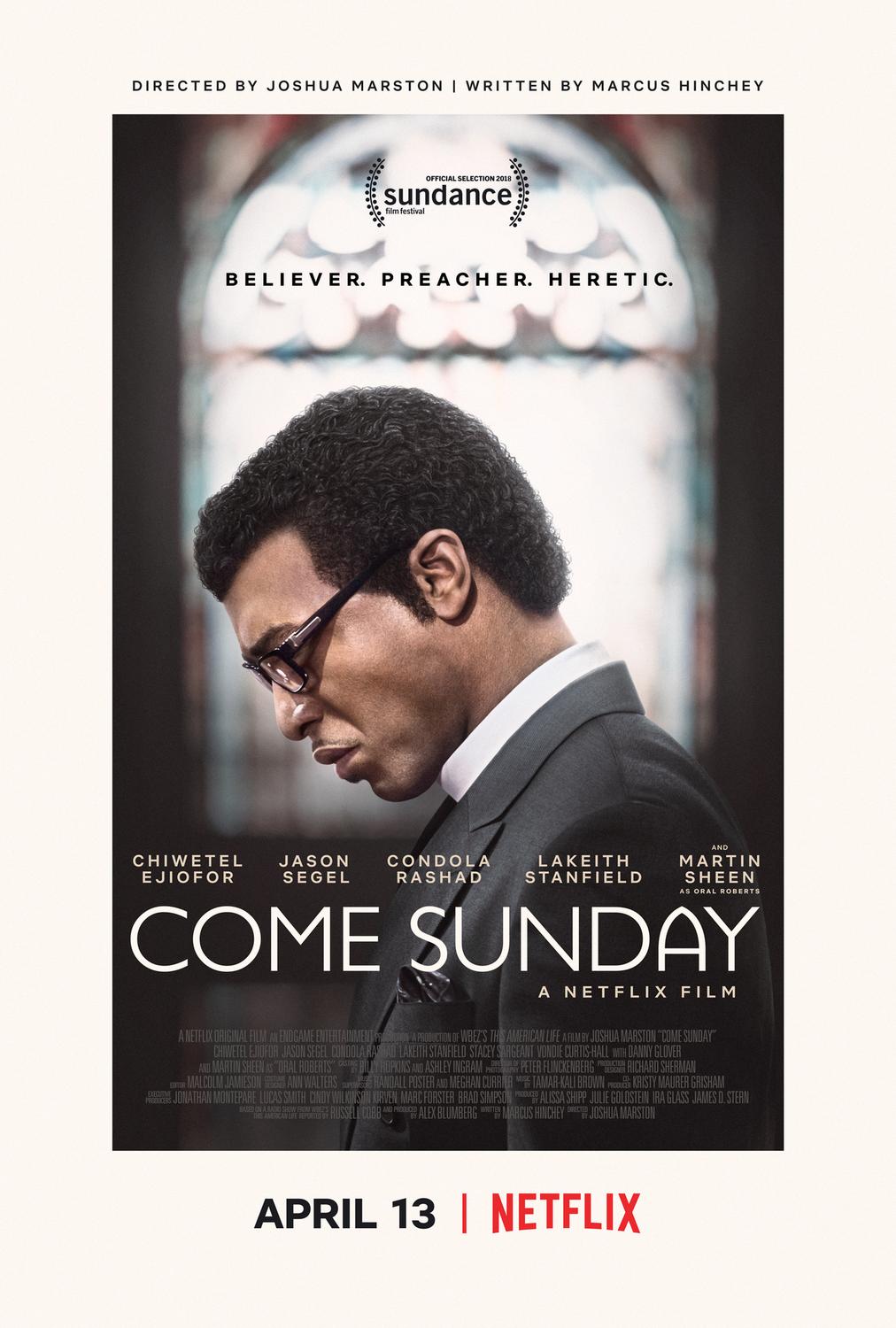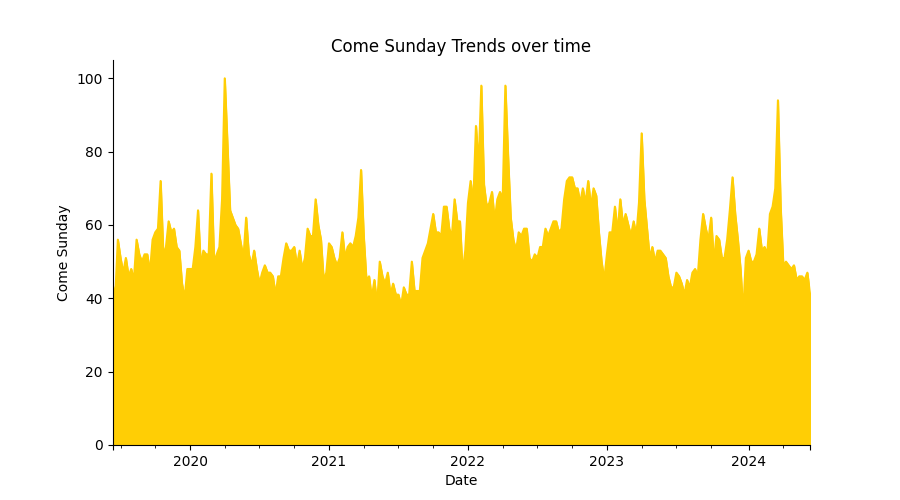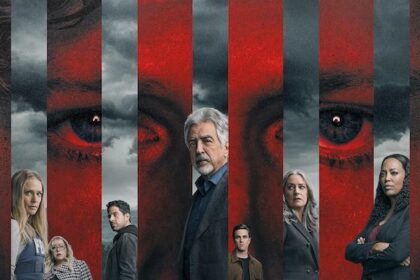
🪶 Story & Synopsis
In the thought-provoking drama “Come Sunday,” directed by Joshua Marston and written by Marcus Hinchey, viewers are taken on a journey into the world of Reverend Carlton Pearson, portrayed by Chiwetel Ejiofor. The story delves into the inner workings of Pearson’s Tulsa church, Higher Dimensions, where faith and business intersect in a complex dance.
The movie opens with a powerful sermon by Reverend Pearson at Higher Dimensions, where he shares his transformative encounter and receives an enthusiastic response from his mega-congregation. Among the attendees is Henry, played by Jason Segel, who serves as Pearson’s loyal friend and the manager of the church venue. The church’s organist, Reggie, portrayed by Lakeith Stanfield, is also deeply moved by the spirit of the sermon.
As the narrative unfolds, the audience is offered glimpses into the behind-the-scenes operations of the church, revealing how religious gatherings are orchestrated like grand performances, akin to rock concerts. The film sheds light on the complexities of running a place of worship as a business, where spiritual beliefs and financial interests often collide.
Despite the weighty themes explored in “Come Sunday,” the movie is not devoid of moments of joy and inspiration. Toe-tapping gospel singing fills the air, complemented by stunning cinematography that captures the essence of faith and community. Jason Segel’s portrayal of Henry as Pearson’s conflicted confidant shines, showcasing the inner turmoil faced by those caught between love and loyalty.
Through a stellar ensemble cast that includes Chiwetel Ejiofor, Jason Segel, Lakeith Stanfield, and more, “Come Sunday” weaves a compelling narrative that challenges viewers to ponder the intersection of faith, business, and personal conviction. The film offers a nuanced exploration of religious beliefs, moral dilemmas, and the enduring power of human connection in the face of adversity.
“Come Sunday” stands out as a thought-provoking and emotionally resonant cinematic experience that invites audiences to contemplate the complexities of belief, the nature of redemption, and the courage required to challenge established norms. With its blend of stirring performances, engaging storytelling, and insightful commentary, the movie leaves a lasting impact, prompting viewers to reflect on their own beliefs and values long after the credits roll.
🧑 Cast & Crew
Chiwetel Ejiofor, Martin Sheen, Danny Glover, Jason Segel, Condola Rashad, Lakeith Stanfield, Stacey Sargeant, Vondie Curtis-Hall
| Actor | Role |
|---|---|
| Chiwetel Ejiofor | Carlton Pearson |
| Martin Sheen | Oral Roberts |
| Condola Rashad | Gina Pearson (Carlton’s wife) |
| Jason Segel | Henry |
| Danny Glover | Reggie |
| Lakeith Stanfield | Danny |
| Stacey Sargeant | Nicky Brown |
💬 Reviews and feedback
Picture this: a rollercoaster of emotions, a whirlwind of faith, and a journey that will leave you questioning everything you thought you knew about spirituality. Welcome to “Come Sunday,” a movie that doesn’t just entertain but challenges your beliefs and tugs at your heartstrings.
Based on the true story of Carlton Pearson, a preacher faced with a crisis of faith that leads him down a controversial path, this film is more than just a passive viewing experience. It’s a deep dive into the complexities of belief and the consequences of standing up for what you think is right.
Plot and Themes:
The plot revolves around Pearson’s realization that everyone, regardless of their beliefs or sins, deserves salvation—a radical departure from traditional Christian teachings. This central theme of inclusivity vs. exclusivity forms the backbone of the narrative, challenging viewers to confront their own convictions.
As the story unfolds, we witness Pearson’s internal struggle, the backlash from his community, and the ultimate test of his unwavering faith. The movie delicately balances heavy theological discussions with personal anecdotes, creating a poignant tapestry of human experience.
Acting and Characters:
Chiwetel Ejiofor’s portrayal of Carlton Pearson is nothing short of mesmerizing. He brings depth and vulnerability to the character, capturing Pearson’s internal turmoil with raw authenticity. The supporting cast shines as well, adding layers to an already rich narrative.
Each character is fleshed out with care and attention to detail, allowing viewers to empathize with their struggles and motivations. From mentors to skeptics, every role contributes to the overarching exploration of faith and doubt.
Direction and Cinematography:
Joshua Marston’s direction infuses the film with a sense of intimacy and urgency. The close-up shots during pivotal moments draw us into the characters’ emotional landscapes, while sweeping vistas convey the magnitude of Pearson’s spiritual journey.
The cinematography captures both the mundane realities of everyday life and the ethereal nature of divine revelation. The visual language serves as a powerful complement to the thematic content, enhancing our immersion in Pearson’s world.
Score and Production Design:
The score sets the tone for each scene masterfully, heightening tension or underscoring moments of revelation. It weaves seamlessly into the fabric of the narrative, enhancing emotional beats without overshadowing them.
The production design creates an authentic backdrop for Pearson’s story, grounding it in reality while allowing room for moments of transcendence. The attention to detail in set design and costuming adds another layer of depth to an already compelling narrative.
Special Effects and Editing:
While “Come Sunday” may not rely heavily on flashy special effects, its editing is sharp and precise. Transitions between past and present are seamless, providing context without disrupting the flow of the story.
The editing pace keeps viewers engaged without rushing through crucial moments. Each scene lingers just long enough to evoke an emotional response before seamlessly transitioning to the next beat in Pearson’s journey.
Binge-watching Tips:
- If you’re intrigued by complex moral dilemmas and nuanced character studies, “Come Sunday” is definitely worth adding to your watchlist.
- Pay close attention to Chiwetel Ejiofor’s nuanced performance—it’s a masterclass in emotional depth
Conclusion:
“Come Sunday” isn’t just a movie; it’s an experience that challenges your beliefs while celebrating compassion and understanding. It invites viewers on a thought-provoking journey that lingers long after the credits roll—a rare gem in today’s cinematic landscape.
RATING: 9/10
In a world full of noise and distractions, “Come Sunday” stands out as a quiet yet powerful reminder that empathy can be found even in our darkest moments—it just takes courage to embrace it wholeheartedly.
| Pros | Cons |
|---|---|
| We Need More Movies Like It | A true, but sad story |
| Beautiful Performances | Not enough moral conversion depth |
| Based on a true story | Leaves viewers with more questions than answers |
| Explores faith and spirituality | Not enough meat in the storyline |
Feedback
-
Come Sunday (film) - Wikipedia
Come Sundayis a 2018 American drama film directed by Joshua Marston and written by Marcus Hinchey, based on “Heretics”, a 2005 episode of the radio showThis American Life. It stars Chiwetel Ejiofor as Carlton Pearson, an evangelist minister who was ostracized by his church and excommunicated for preaching that there is no Hell. Jason Segel, Condola Rashad, Lakeith Stanfield, Stacey Sargeant, Vondie Curtis-Hall, Danny Glover, and Martin Sheen also star.
Come Sunday Directed by Joshua Marston Written by Marcus Hinchey Based on “Heretics” fromThis American Life by Russell Cobb
-
Come Sunday movie review & film summary (2018) | Roger Ebert
This movie is adapted from a 2005 “This American Life” episode called “Heretics,” which told Pearson’s story. This movie is distinguished by some powerful performance. Chiwetel Ejiofor is both dynamic and credibly contemplative as Pearson. Lakeith Stanfield plays Reggie, a character who’s HIV-positive, and consistently encouraged by Pearson to deny who he is: “You can be gay and not do gay,” the preacher advises, after he’s had his epiphany. Stanfield’s work provides the movie’s most resonant emotional notes. Condola Rashad is excellent as Pearson’s conflicted wife, and Martin Sheen and Danny Glover provide superb support. Segel’s Henry, who breaks off a splinter church after Pearson persists in his “heresy,” is underwritten, but the actor soldiers through the role with integrity.
-
Come Sunday | Official Trailer [HD] | Netflix - YouTube
⚠️ Explanation (Spoiler)
In the movie “Come Sunday,” directed by Joshua Marston, the story revolves around Carlton Pearson, played by Chiwetel Ejiofor, a charismatic pastor at Higher Dimensions church in Tulsa. The narrative delves into Pearson’s journey of questioning traditional Christian beliefs after witnessing suffering in the world. This leads him to declare that Hell doesn’t exist, causing a rift within his congregation and the wider religious community.
The film portrays Pearson’s internal conflict, especially regarding the fate of those who haven’t accepted his gospel. His wife, portrayed by Condola Rashad, grapples with her own beliefs amidst the turmoil. Martin Sheen and Danny Glover deliver strong performances as influential figures in Pearson’s life, adding depth to the storyline.
One of the pivotal characters is Reggie, played by Lakeith Stanfield, a church member who faces discrimination due to his HIV-positive status. Pearson’s evolving views on acceptance and inclusion are highlighted through his interactions with Reggie, providing emotional depth to the narrative.
As Pearson faces backlash and isolation for his controversial beliefs, the movie explores themes of faith, acceptance, and the consequences of challenging established dogma. The performances by the cast, including Jason Segel as Henry, add layers to the story, showcasing the complexities of belief systems and personal convictions.
Throughout the film, the audience witnesses Pearson’s struggle to reconcile his evolving faith with societal expectations, culminating in a poignant confrontation with Reggie that underscores the broader implications of his beliefs. The movie offers a thought-provoking exploration of religion, compassion, and the search for spiritual truth in the face of adversity.
👪 Parents Guide & Age Rating
TV-14
Age Rating:
Come Sunday is rated PG-13 for thematic elements including mature discussions about religious beliefs and challenges to traditional doctrine.
Parental Guide:
Parents need to know that Come Sunday is a fact-based drama that delves into mature themes and may not be suitable for younger viewers. Here’s what parents can expect in terms of content:
- Language: The movie includes the use of strong language such as “hell,” “ass,” and “bulls–t.”
- Violence: There is no intense violence depicted in the movie.
- Sex/Nudity: There are no sexual scenes or nudity in the film.
- Drugs/Alcohol: Characters are seen drinking red wine on a plane ride.
- Profanity: Some strong language is used throughout the movie.
Overall, Come Sunday is recommended for viewers aged 13 and above due to its mature themes and language content.
📺 Streaming and where to watch
| streaming service | extra information |
|---|---|
| Netflix | Come Sunday is available to watch on Netflix. Netflix is a subscription-based streaming service that consists of a wide range of successful movies, TV shows, documentaries, and reality shows. |
❝ Quotes and Cult
Evangelist Carlton Pearson is ostracized by his church for denying the existence of Hell.
What does Netflix's 'Come Sunday' say about who goes to heaven?
But in the early 2000s, things began to change—and this is where the story of Come Sunday takes off.
A beloved uncle of Pearson's, who had not been 'saved,' hangs himself in prison ...
The opening scene of this fact-based drama is set on an airplane about to fly to Tulsa.
The lawyer, apparently a stressed-out one, given the way she speaks on her cell phone, takes a seat next to a man who soon introduces himself as a pastor.
The lawyer, never named but well-played by Allie McCulloch, seems likely to rebuff Carlton ...
Things look good for the Rev. But he soon finds himself rebuffing a relative who’s asked him to use his influence with a parole situation.
The relative takes the rebuff very badly—he kills himself.
Later, Pearson is watching television footage of starving children in Africa.
His mind takes him to a place that philosophers call theodicy—the questioning of how a supposedly loving God can allow such suffering in the world.
Pearson’s a bit more concerned with the afterworld, though. He can’t bear the idea of suffering people who haven’t been 'saved' through his gospel going to Hell.
So he concludes—or, he insists, he is told by God—that Hell isn’t real.
And he announces his findings in a sermon. So his troubles begin.
This movie is adapted from a 2005 “This American Life” episode called “Heretics,” which told Pearson’s story.
This movie is distinguished by some powerful performance.
Chiwtel Ejiofor is both dynamic and credibly contemplative as Pearson.
Lakeith Stanfield plays Reggie, a character who’s HIV-positive, and consistently encouraged by Pearson to deny who he is: “You can be gay and not do gay,” the preacher advises, after he’s had his epiphany.
Stanfield’s work provides the movie’s most resonant emotional notes.
Condola Rashad is excellent as Pearson’s conflicted wife, and Martin Sheen and Danny Glover provide superb support.
Segel’s Henry, who breaks off a splinter church after Pearson persists in his “heresy,” is underwritten, but the actor soldiers through the role with integrity.
The movie itself, overall, feels kind of bloodless.
Scenes in which Pearson is called upon to defend his new vision kind of fizzle rather than catch fire.
The collapse of his church is depicted in undifferentiated scenes that pack no punch.
Pearson’s spiritual and practically adoptive father Oral Roberts rebuffs his acolyte in the quietest, politest way possible.
It’s only at the end, when Pearson and Reggie have a moving confrontation, and Pearson’s epiphany is shown to have a political dimension, that the movie shows signs of digging in its heels.
Up until that point, well-acted and “interesting” is all it can offer.
🤖Come Sunday Reddit Talks
Come Sunday, a powerful movie based on the true story of Bishop Carlton Pearson, has sparked thought-provoking discussions on Reddit. The movie follows Pearson’s journey as he grapples with his faith and ultimately rejects the traditional Christian belief in hell, leading to a loss of his congregation and fortune.
A Challenge to Christian Teachings:
The movie has ignited debates about the nature of salvation and the exclusivity of Christianity. Pearson’s belief that everyone is saved, regardless of their religious affiliation, has challenged the traditional Christian doctrine of exclusivity. This has led to discussions about the nature of God’s love and the possibility of universal salvation.
The Power of Personal Experience:
Pearson’s journey is a testament to the power of personal experience in shaping one’s beliefs. His encounter with a dying woman who expressed fear of hell led him to question his own beliefs and ultimately reject the concept of eternal punishment. This has resonated with viewers who have had similar experiences that have led them to re-examine their own faith.
The Importance of Inclusivity:
The movie also highlights the importance of inclusivity and acceptance. Pearson’s message of universal salvation has been seen as a call for a more compassionate and welcoming Christianity. It has sparked discussions about the need to embrace diversity and reject judgment within religious communities.
The Impact of Faith on Life:
Come Sunday also explores the impact of faith on one’s life. Pearson’s journey shows how his beliefs shaped his actions and relationships. It has led to discussions about the role of faith in personal decision-making and the challenges faced by those who hold unpopular or controversial beliefs.
The Complexity of Faith:
The movie doesn’t provide easy answers or clear-cut conclusions. Instead, it presents a complex and nuanced portrayal of faith and its complexities. It has sparked discussions about the challenges of reconciling different beliefs, the importance of dialogue, and the ongoing search for truth and meaning in life.
Overall, Come Sunday has generated a wealth of insightful discussions on Reddit, exploring themes of salvation, the nature of God’s love, the power of personal experience, the importance of inclusivity, and the impact of faith on life. The movie has challenged traditional Christian beliefs, raised questions about the nature of faith, and sparked conversations about the ongoing search for truth and meaning.
Top discussions
- https://www.reddit.com/r/TrueChristian/comments/8fpa4q/dont_come_sunday/
- https://www.reddit.com/r/Christianity/comments/bkt3qu/the_movie_come_sunday/
- https://www.reddit.com/r/Exvangelical/comments/192o9rf/did_anyone_see_the_film_come_sunday_2018_it_has/
- https://www.reddit.com/r/blackladies/comments/9exaaf/come_sunday_is_such_a_thoughtprovoking_movie_i/
- https://www.reddit.com/r/YMS/comments/8n4mu1/have_any_of_you_guys_seen_come_sunday_on_netflix/
❓ Frequently Asked Questions
What is the story behind the movie Come Sunday?
A drama about Bishop Carlton Pearson, who was ostracized by his own church for preaching the belief that there is no Hell. The film was directed by Joshua Marston, and it was written by Marcus Hinchey. It stars Chiwetel Ejiofor, Jason Segel, Lakeith Stanfield, Condola Rashad, Martin Sheen, and Danny Glover.
What pastor is Come Sunday about?
It stars Chiwetel Ejiofor as Carlton Pearson, an evangelist minister who was ostracized by his church and excommunicated for preaching that there is no Hell. Jason Segel, Condola Rashad, Lakeith Stanfield, Stacey Sargeant, Vondie Curtis-Hall, Danny Glover, and Martin Sheen also star.
What happens on Come Sunday?
Its plot device is to present the real-life story of former Christian pastor Carlton Pearson, who comes to believe that God verbally told him everyone goes to Heaven, including active, unrepentant sinners and non-believers of every stripe.
Whose life is Come Sunday based on?
Directed by Joshua Marston, the first feature film financed by This American Life is based on the story of Bishop Carlton Pearson, the former senior pastor of Higher Dimensions Evangelistic Center—one of the largest churches in Tulsa, Oklahoma—and one of the first black televangelists.
🔀 Recommended Movie and TV Show
- Crown Heights: Based on a true story, this drama follows a man fighting to prove his innocence after being wrongfully convicted of murder.
- Same Kind of Different as Me: A wealthy couple befriends a homeless man, leading to a remarkable journey of friendship, forgiveness, and redemption.
- Roxanne Roxanne: This biographical film tells the story of Roxanne Shanté, a young rapper from Queens, New York, who becomes a hip-hop legend.
Wallpapers & Media
🔥 Audience Trends









